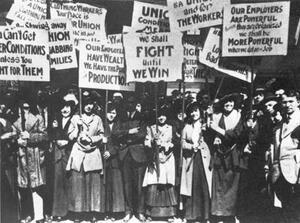Dorothy Jacobs Bellanca: The People's Voice
Dorothy Jacobs Bellanca was not a women’s rights activist. She was a people’s rights activist.
She understood the problems of the working class—people of all genders, ages, and backgrounds—and sought to improve conditions for workers.
It just so happened that along the way, she became a leader in a way that was unprecedented for women of her era.
Bellanca was born in Latvia in 1894 and emigrated to Baltimore, Maryland in 1900. At age 13, she began work in a garment factory, where she experienced firsthand the poor conditions of garment workers. In 1912 she helped stage a walkout that eventually caused a strike throughout the garment industry. By 1914, she was helping to lead Amalgamated Clothing Workers of America (ACWA), a newly founded union of garment workers. In 1917 Bellanca became the ACWA's first full-time female organizer, and in 1934 she became the vice president of ACWA, making her the only female vice president of a major trade union. She held this position until her death in 1946. During the Great Depression, Bellanca fought against racial discrimination in the workplace. She was part of the New York City Mayor's Commission on Unity and worked to organize the New York branch of the American Labor Party. She became a strong supporter of FDR, and even made an unsuccessful run for Congress in 1938.
When I think of Dorothy Jacobs Bellanca, I think of an unstoppable woman characterized by integrity and a strong sense of justice. I am drawn to her because of the simplicity of her actions: she saw a problem—lived a problem—and decided it was time for a change. Sometimes I think about wanting to change the world, and get stuck wondering which issue I could best address. What I have learned from reading about Bellanca is that the choice can make itself. While it is selfless and brave to tackle problems facing other people, I must first think about issues that impact my world. I see Bellanca as an embodiment of Hillel's words, “If I am not for myself, who will be for me?”
If Bellanca were still alive today, she would still be advocating for worker's rights. She might focus on current issues such as conditions for immigrant workers, equal work for equal pay, and ethical overseas labor and trade. Certain facets of industrial labor have changed drastically since Bellanca’s time. For instance, she would be very impressed by the existence and enforcement of strict child labor laws. However, some things have stayed dangerously the same. The United States has yet to enforce positive policy around immigrant workers and overseas labor. I can see Bellanca, both as an immigrant and as a workers’ rights activist, being incensed at how some workers are still being treated in 2014.
When I first read about Bellanca, I wondered if she would be considered a person of note if she were working today. At first I thought that she would probably not be; after all, it is not as surprising when women take on leadership and activism roles in the 21st century.
However, the more I consider it, the more I think that Bellanca would probably have achieved even more with her life if she had been living in a time with more gender equity. Perhaps she would have become president of a union instead of VP, or won her senatorial race and even run for higher office than the senate. It is hard to say exactly how much renown she would have wanted. My guess is that Bellanca was concerned not with her own position of power, but with empowering those who were going unnoticed and giving them a voice.
This piece was written as part of JWA’s Rising Voices Fellowship.







